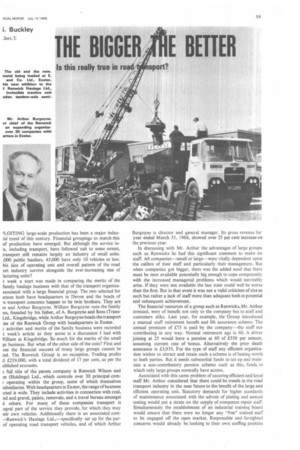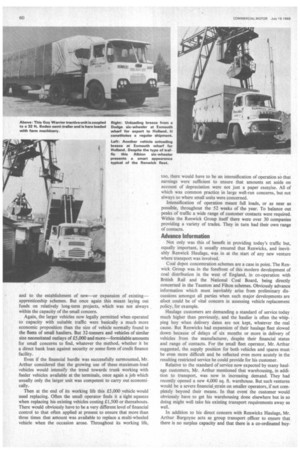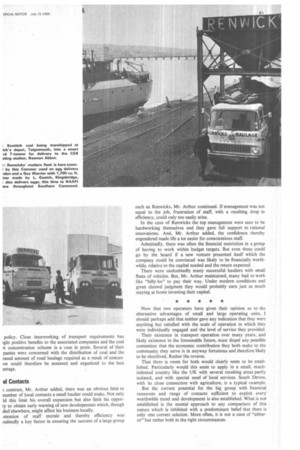)LOITING large-scale production has been a major indusial trend of
Page 61

Page 62

Page 63

If you've noticed an error in this article please click here to report it so we can fix it.
this century. Financial groupings to match this of production have emerged. But although the service in:s, including transport, have followed suit to some extent, transport still remains largely an industry of small units. ,000 public hauliers, 43,000 have only 10 vehicles or less. his Size of operating unit and overall pattern of the road ort industry survive alongside the ever-increasing size of 'acturing units?
t week a start was made in comparing the merits of the family haulage business with that of the transport organizassociated with a large financial group. The two selected for trison both have headquarters in Devon and the heads of .o transport concerns happen to be twin brothers. They are m and Arthur Burgoyne. William Burgoyne runs the family :ss, founded by his father, of A. Burgoyne and Sons (TransLtd., Kingsbridge, while Arthur Burgoyne heads the transport .ies of the Renwick Group with headquarters in Exeter.
activities and merits of the family business were recorded t week's article as they arose in a discussion I had with Villiam at Kingsbridge. So much for the merits of the small ge business. But what of the other side of the coin? First and ost the financial success of many large groups cannot be ted. The Renwick Group is no exception. Trading profits d £259,000, with a total dividend of 17 per cent, as per the ublished accounts.
full title of the parent company is Renwick Wilson and mt (Holdings) Ltd., which controls over 30 principal corn; operating within the group, some of which themselves :ubsidiaries. With headquarters in Exeter, the range of business icted is wide. They include activities in connection with coal, nd and gravel, paints, removals, and a travel bureau amongst others. For many of these companies transport is ,egral part of the service they provide, for which they may leir own vehicles. Additionally there is an associated corn-Renwick's Haulage Ltd.,—specifically set up for the purof operating road transport vehicles, and of which Arthur Burgoyne is director and general manager. Its gross revenue for year ended March 31, 1966, showed over 25 per cent increase on the previous year.
In discussing with Mr. Arthur the advantages of large groups such as Renwicks he had this significant comment to make on staff. All companies—small or large—were vitally dependent upon the calibre of their staff and particularly their management. But when companies got bigger, there was the added need that there must be men available potentially big enough to cope competently with the increased managerial problems which would inevitably arise. If they were not available the last state could well be worse than the first. But in that event it was not a valid criticism of size as such but rather a lack of staff more than adequate both in potential and subsequent achievement.
The financial resources of a group such as Renwicks, Mr. Arthur stressed, were of benefit not only to the company but to staff and customers alike. Last year, for example, the Group introduced a manual staff retirement benefit and life assurance scheme. The annual premium of £75 is paid by the company—the staff not contributing in any way. Normal retirement age is 60. A driver joining at 25 would have a pension at 60 of £556 per annum, assuming current rate of bonus. Alternatively the prior death assurance is £3,935. For the type of staff any efficient organization wishes to attract and retain such a scheme is of lasting worth to both parties. But it needs substantial funds to set up and main tam n a non-contributory pension scheme such as this, funds to which only large groups normally have access.
Associated with this same problem of securing efficient and loyal staff Mr. Arthur considered that there could be trends in the road transport industry in the near future to the benefit of the large and efficient operating unit. Statutory demands for higher standards of maintenance associated with the advent of plating and annual testing would put a strain on the supply of competent repair staff. Simultaneously the establishment of an industrial training board would ensure that there were no longer any "free" trained staff to be engaged off the open market. Responsible and farsighted concerns would already be looking to their own staffing position and to the establishment of new—or expansion of existing— apprenticeship schemes. But once again this meant laying out funds on relatively long-terra projects, which was not always within the capacity of the small concern.
Again, the larger vehicles now legally permitted when operated to capacity with suitable traffic were basically a much more economic proposition than the size of vehicle normally found in the fleets of small hauliers. But 32-tonners and vehicles of similar size necessitated outlays of £.5,000 and more—formidable amounts for small concerns to find, whatever the method, whether it be a direct bank loan against security or some form of credit finance facility.
Even if the financial hurdle was successfully surmounted, Mr. Arthur considered that the growing use of these maximum-load vehicles would intensify the trend towards trunk working with feeder vehicles available at the terminals, once again a job which usually only the larger unit was competent to carry out economically.
Then at the end of its working life this £5,000 vehicle would need replacing. Often the small operator finds it a tight squeeze when replacing his existing vehicles costing £1,500 or thereabouts. There would obviously have to be a very different level of financial control to that often applied at present to ensure that more than three times that amount was available to replace a multi-wheeled vehicle when the occasion arose. Throughout its working life, too, there would have to be an intensification of operation so that earnings were sufficient to ensure that amounts set aside on account of depreciation were not just a paper exercise. All of which was common practice in large well-run concerns, but not always so where small units were concerned.
Intensification of operation meant full loads, or as near as possible, throughout the 52 weeks of the year. To balance out peaks of traffic a wide range of customer contacts were required. Within the Renwick Group itself there were over 30 companies providing a variety of trades. They in turn had their own range of contacts.
Advance Information
Not only was this of benefit in providing today's traffic but, equally important, it usually ensured that Renwicks, and inevitably Renwick Haulage, was in at the start of any new venture where transport was involved.
Coal depot concentration schemes are a case in point. The Renwick Group was in the forefront of this modern development of coal distribution in the west of England, in co-operation with British Rail and the National Coal Board, being directly concerned in the Taunton and Filton schemes. Obviously advance information which must inevitably arise from preliminary discussions amongst all parties when such major developments are afoot could be of vital concern in assessing vehicle replacement policy, for example.
Haulage customers are demanding a standard of service today much higher than previously, and the haulier is often the whipping boy when delivery dates are not kept, whatever the real cause. But Renwicks had expansion of their haulage fleet slowed down because of delays of six months or more in delivery of vehicles from the manufacturer, despite their financial status and range of contacts. For the small fleet operator, Mr. Arthur suggested, the supply position for both vehicles and spares must be even more difficult and be reflected even more acutely in the resulting restricted service he could provide for his customer.
Relative to the standard of service now expected by many haulage customers, Mr. Arthur mentioned that warehousing, in addition to transport, was now in increasing demand. They had recently opened a new 4,000 sq. ft. warehouse. But such ventures would be a severe financial strain on smaller operators, if not completely beyond their means. In that event the customer would obviously have to get his warehousing done elsewhere but in so doing might well take his existing transport requirements away as well.
In addition to his direct concern with Renwicks Haulage, Mr. Arthur Burgoyne acts as group transport officer to ensure that there is no surplus capacity and that there is a co-ordinated buy
policy. Close interworking of transport requirements has ight positive benefits to the associated companies and the coal yt concentration scheme is a case in point. Several of their panics were concerned with the distribution of coal and the eased amount of road haulage required as a result of concenon could therefore be assessed and organized to the best intage.
al Contacts
I contrast, Mr. Arthur added, there was an obvious limit to number of local contacts a small haulier could make. Not only Id this limit his overall expansion but also limit his opporty to obtain early warning of new developments which, though ded elsewhere, might affect his business locally.
.etention of staff morale and thereby efficiency was oubtedly a key factor in ensuring the success of a large group such as Renwicks, Mr. Arthur continued. If management was not equal to the job, frustration of staff, with a resulting drop in efficiency, could only too easily arise.
In the case of Renwicks the top management were seen to be hardworking themselves and they gave full support to rational innovations. And, Mr. Arthur added, the confidence thereby engendered made life a lot easier for conscientious staff.
Admittedly, there was often the financial restriction in a group of having to work within budget targets. But even those could go by the board if a new venture presented itself which the company could be convinced was likely to be financially worthwhile, relative to the capital needed and the return expected.
There were undoubtedly many successful hauliers with small fleets of vehicles. But, Mr. Arthur maintained, many had to work like "billy-ho" to pay their way. Under modern conditions and given shrewd judgment they would probably earn just as much staying at home investing their capital.
Now that two operators have given their opinion as to the alternative advantages of small and large operating units, I should perhaps add that neither gave any indication that they were anything but satisfied with the scale of operation in which they were individually engaged and the level of service they provided.
Their existence in transport operation over many years, and likely existence in the foreseeable future, must dispel any possible contention that the economic contribution they both make to the community they serve is in anyway fortuitous and therefore likely to be shortlived. Rather the reverse.
That there is room for both would clearly seem to be established. Particularly would this seem to apply in a small, muchindented country like the UK with several resulting areas partly isolated, and with special need of local services. South Devon, with its close connection with agriculture, is a typical example.
But the current potential for the big group with financial resources and range of contacts sufficient to exploit every' worthwhile trend and development is also established. What is not established is the mentalapproach to any comparison of this nature which is inhibited with a predominant belief that there is only one correct solution. More often, it is not a case of "eitheror" but rather both in the right circumstances.
























































































































